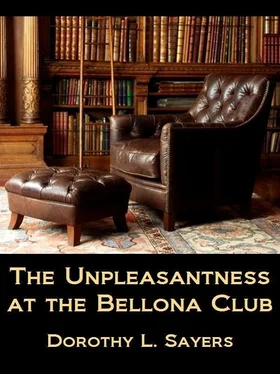“Yours obediently,
“M. BUNTER.”
“Cross the gipsy’s palm with silver,” said his lordship, happily, and rolled into bed.
Chapter XI
Lord Peter Clears Trumps
“Sleuths Incorporated’s” report, when it came, might be summed up as “Nothing doing and Major Fentiman convinced that there never will be anything doing; opinion shared by Sleuths Incorporated.” Lord Peter’s reply was: “Keep on watching and something will happen before the week is out.”
His lordship was justified. On the fourth evening, “Sleuths Incorporated” reported again by telephone. The particular sleuth in charge of the case had been duly relieved by Major Fentiman at 6 p.m. and had gone to get his dinner. On returning to his post an hour later, he had been presented with a note left for him with the ticket-collector at the stair-head. It ran:
“Just seen Oliver getting into taxi. Am following. Will communicate to refreshment-room.
“FENTIMAN.”
The sleuth had perforce to return to the refreshment room and hang about waiting for a further message. “But all the while, my lord, the second man I put on as instructed by you, my lord, was a-following the Major unbeknownst.” Presently a call was put through from Waterloo. “Oliver is on the Southampton train. I am following.” The sleuth hurried down to Waterloo, found the train gone and followed on by the next. At Southampton he made inquiries and learned that a gentleman answering to Fentiman’s description had made a violent disturbance as the Havre boat was just starting, and had been summarily ejected at the instance of an elderly man whom he appeared to have annoyed or attacked in some way. Further investigation among the Port authorities made it clear that Fentiman had followed this person down, made himself offensive on the train and been warned off by the guard, collared his prey again on the gangway and tried to prevent him from going aboard. The gentleman had produced his passport and pièces d’identité, showing him to be a retired manufacturer of the name Postlethwaite, living at Kew. Fentiman had insisted that he was, on the contrary a man called Oliver, address and circumstances unknown, whose testimony was wanted in some family matter. As Fentiman was unprovided with a passport and appeared to have no official authority for stopping and questioning travellers, and as his story seemed vague and his manner agitated, the local police had decided to detain Fentiman. Postlethwaite was allowed to proceed on his way, after leaving his address in England and his destination, which, as he contended, and as he produced papers and correspondence to prove, was Venice.
The sleuth went round to the police-station, where he found Fentiman, apoplectic with fury, threatening proceedings for false imprisonment. He was able to get him released, however, on bearing witness to Fentiman’s identity and good faith, and after persuading him to give a promise to keep the peace. He had then reminded Fentiman that private persons were not entitled to assault or arrest peaceable people against whom no charge could be made, pointing out to him that his proper course, when Oliver denied being Oliver, would have been to follow on quietly and keep a watch on him, while communicating with Wimsey or Mr. Murbles or Sleuths Incorporated.
He added that he was himself now waiting at Southampton for further instructions from Lord Peter. Should he follow to Venice, or send his subordinate, or should he return to London? In view of the frank behaviour of Mr. Postlethwaite, it seemed probable that a genuine mistake had been made as to identity, but Fentiman insisted that he was not mistaken.
Lord Peter, holding the trunk line, considered for a moment. Then he laughed.
“Where is Major Fentiman?” he asked.
“Returning to town, my lord. I have represented to him that I have now all the necessary information to go upon, and that his presence in Venice would only hamper my movements, now that he has made himself known to the party.”
“Quite so. Well, I think you might as well send your man on to Venice, just in case it’s a true bill. And listen”… He gave some further instructions, ending with: “And ask Major Fentiman to come and see me as soon as he arrives.”
“Certainly, my lord.”
“What price the gipsy’s warning now?” said Lord Peter, as he communicated that piece of intelligence to Bunter.
Major Fentiman came round to the flat that afternoon, in a whirl of apology and indignation.
“I’m sorry, old man. It was damned stupid of me, but I lost my temper. To hear that fellow calmly denying that he had ever seen me or poor old grandfather, and coming out with his bits of evidence so pat, put my bristles up. Of course, I see now that I made a mistake. I quite realise that I ought to have followed him up quietly. But how was I to know that he wouldn’t answer to his name?”
“But you ought to have guessed when he didn’t, that either you had made a mistake or that he had some very good motive for trying to get away,” said Wimsey.
“I wasn’t accusing him of anything.”
“Of course not, but he seems to have thought you were.”
“But why? — I mean, when I first spoke to him, I just said, ‘Mr. Oliver, I think?’ And he said, ‘You are mistaken.’ And I said, ‘Surely not. My name’s Fentiman, and you knew my grandfather, old General Fentiman.’ And he said he hadn’t the pleasure. So I explained that we wanted to know where the old boy had spent the night before he died, and he looked at me as if I was a lunatic. That annoyed me, and I said I knew he was Oliver, and then he complained to the guard. And when I saw him just trying to hop off like that, without giving us any help, and when I thought about that half-million, it made me so mad I just collared him. ‘Oh, no, you don’t,’ I said — and that was how the fun began, don’t you see.”
“I see perfectly,” said Wimsey. “But don’t you see, that if he really is Oliver and has gone off in that elaborate manner, with false passports and everything, he must have something important to conceal.”
Fentiman’s jaw dropped.
“You don’t mean — you don’t mean there’s anything funny about the death? Oh! surely not.”
“There must be something funny about Oliver, anyway, mustn’t there? On your own showing?”
“Well, if you look at it that way, I suppose there must. I tell you what, he’s probably got into some bother or other and is clearing out. Debt, or a woman, or something. Of course that must be it. And I was beastly inconvenient popping up like that. So he pushed me off. I see it all now. Well, in that case, we’d better let him rip. We can’t get him back, and I daresay he won’t be able to tell us anything after all.”
“That’s possible, of course. But when you bear in mind that he seems to have disappeared from Gatti’s, where you used to see him, almost immediately after the General’s death, doesn’t it look rather as though he was afraid of being connected up with that particular incident?”
Fentiman wriggled uncomfortably.
“Oh, but, hang it all! What could he have to do with the old man’s death?”
“I don’t know. But I think we might try to find out.”
“How?”
“Well, we might apply for an exhumation order.”
“Dig him up!” cried Fentiman, scandalised.
“Yes. There was no post-mortem, you know.”
“No, but Penberthy knew all about it and gave the certificate.”
“Yes; but at that time there was no reason to suppose that anything was wrong.”
“And there isn’t now.”
“There are a number of peculiar circumstances, to say the least.”
“There’s only Oliver — and I may have been mistaken about him.”
Читать дальше












